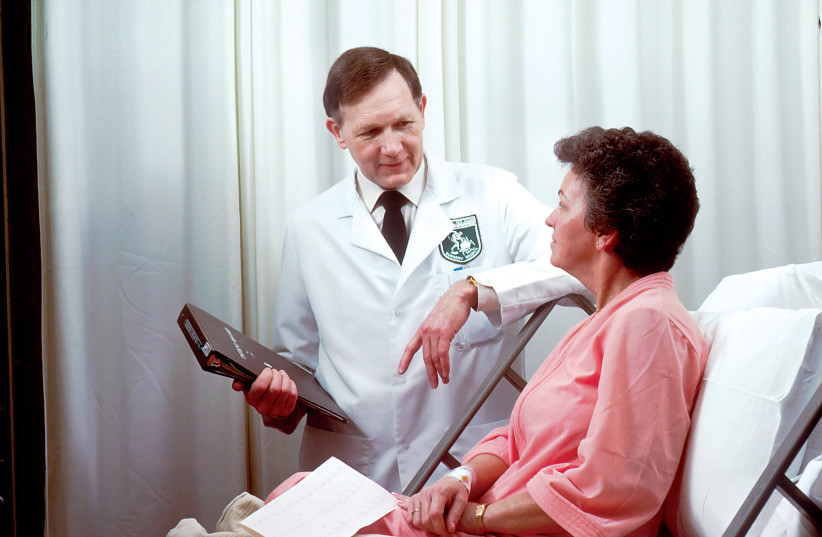The Tel Aviv University Medical School has recently announced drastic changes in its program and enrollment strategies.
The changes presented are likely to reflect positively on the quality of the training offered by the university, embracing alternative and updated teaching strategies. In this sense, in-person teaching switched from a “frontal lecture instruction” model to alternative ones, including discussion of clinical scenarios and workshops.
Moreover, the Israeli system for medical studies will retain its uniqueness in offering both a six- and a four-year program, including more students in the latter. This shows further commitment to early exposure to clinical settings and addresses the lack of medical staff that Israel will likely face in the upcoming years. However, this extensive (and welcomed) reform in the medical school’s program offers the opportunity for reflection on the program’s subjects, and not just the methods.
Approximately 200 years ago, Rudolf Virchow, the father of modern pathology, witnessed an epidemic of typhus and pointed out the causative factors between social and economic status, and the outbreak itself. He noted that in this context, medical therapy would be of little effect, whereas social change – which he referred to as “complete and unrestricted democracy” – was the answer to limiting the spread and preventing the next epidemic. He addressed the studying of the interactions between social sciences and medicine as “social medicine.”
Colleagues opposed his vision, remarking that technical advances will ultimately compensate for the need for social change – a vision that unfortunately still holds true. While the research community has been publishing increasingly on social medicine, medical institutions (e.g., hospitals, universities) seem to ignore or, at best, minimize its importance. Social medicine is only marginally included in some of the programs from the five Israeli medical schools.

This approach has practical repercussions, with modern medical decision-making being mostly guided by data outcomes. It is, unfortunately, easy (and common) to deliver care centered around a diagnosis, rather than the patient. Understaffed social workers deal with a broader concept of patients, allowing clinical staff to focus on treating the disease and minimizing the length of stay.
This ultimately allows for the near-complete removal of the physician’s responsibility toward the patient’s well-being as an individual, deliberately ignoring a patient’s outlook on the disease and society’s outlook on the patient.
As a surgeon, I often asked myself whether a certain problem could have been recognized earlier? If not, why? How does the patient understand a procedure and its implications? How will this change his/her place in his/her family and community? Addressing the complex interaction between society, economics, politics, and medicine can improve current and future care by recognizing barriers to healthcare and addressing societal and healthcare factors impairing a healing process.
Systemic healthcare injustice
ISRAEL IS not immune from extreme disparities in healthcare, both within and outside the 1967 boundaries. Stemming from deep roots in ideology and militarism, barriers against groups who threaten the Israeli national project and communities from the geographical and demographic periphery of the country can be found throughout history. Systemic injustice reflects on all aspects of healthcare: against those seeking access to healthcare, on the way they relate to the health system and medical staff, and ultimately among members of the medical staff themselves.
The Israeli health system itself became the power figure enforcing discriminating policies. Thus, in Israel just as everywhere else, social medicine is deeply intertwined with our everyday clinical practice, whether we recognize it or not. Challenges faced by physicians treating patients in Beersheba, Haifa, Tel Aviv, or Jerusalem are both different and unique, reflecting the importance of addressing social medicine on a local and global scale.
The changes implemented by Tel Aviv University are undoubtedly praiseworthy. However, the teaching of social medicine is as crucial now, as it was 200 years ago. This is not uncharted territory, and different medical school programs worldwide have been recently embracing this model, mandating courses where the impact of social, economic, and political variables on medical care for local communities are discussed with the medical students.
In a remarkable example of the importance of the issue in modern medical training, such courses bear the names of “Essentials of the Profession” and “Foundations of Clinical Medicine” at Harvard and Stanford medical schools. These show that the inclusion of a well-structured, nationwide program on social medicine across our medical schools, discussing the complex dynamics between patients, diseases, and healthcare providers is a first step toward improving patient care beyond outcome medicine.
The integration of medicine with social sciences is visionary and innovative. As academic physicians, engaging our students in dealing with principles of equality and social justice through their training is key to setting up the next generation of physicians as better clinicians and, hopefully, the main promoters of social change.
The writer is a surgeon at Assuta Medical Center in Ashdod and a board member of Physicians for Human Rights Israel.
